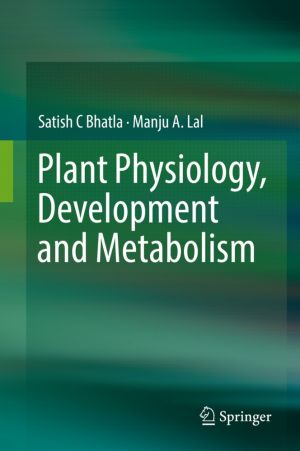Plant Physiology, Development and Metabolism
by Satish C Bhatla, Manju A. Lal
DescriptionDetailsHashtagsReport an issue 






Book Description
This book focuses on the fundamentals of plant physiology for undergraduate and graduate students. It consists of 34 chapters divided into five major units. Unit I discusses the unique mechanisms of water and ion transport, while Unit II describes the various metabolic events essential for plant development that result from plants’ ability to capture photons from sunlight, to convert inorganic forms of nutrition to organic forms and to synthesize high energy molecules, such as ATP. Light signal perception and transduction works in perfect coordination with a wide variety of plant growth regulators in regulating various plant developmental processes, and these aspects are explored in Unit III. Unit IV investigates plants’ various structural and biochemical adaptive mechanisms to enable them to survive under a wide variety of abiotic stress conditions (salt, temperature, flooding, drought), pathogen and herbivore attack (biotic interactions). Lastly, Unit V addresses the large number of secondary metabolites produced by plants that are medicinally important for mankind and their applications in biotechnology and agriculture. Each topic is supported by illustrations, tables and information boxes, and a glossary of important terms in plant physiology is provided at the end.This open book is licensed under a Creative Commons License (CC BY). You can download Plant Physiology, Development and Metabolism ebook for free in PDF format (38.3 MB).
Book Details
Title
Plant Physiology, Development and Metabolism
Subject
Business and Economics
Publisher
Springer
Published
2018
Pages
1251
Edition
1
Language
English
ISBN13
9789811320224
ISBN10
9811320225
ISBN13 Digital
9789811320231
ISBN10 Digital
9811320233
PDF Size
38.3 MB
License

Related Books

This open access book introduces the theoretical frameworks and academic debates concerning sexual cultural practices and HIV/AIDS in Africa. It shows how these frameworks have been applied in a practical sense in Africa to investigate sexual cultural practices and their link with HIV/AIDS. The author provides an overview of both the field of study...

This book offers a devastating look at deeply flawed development processes driven by international finance, African governments and the global consulting industry. It examines major river basin development underway in the semi-arid borderlands of Ethiopia, Kenya and South Sudan and its disastrous human rights consequences for a half-million indigen...

This book presents methods to evaluate sustainable development using economic tools. The focus on sustainable development takes the reader beyond economic growth to encompass inclusion, environmental stewardship and good governance. Sustainable Development Goals (SDGs) provide a framework for outcomes. In illustrating the SDGs, the book employs thr...

This book offers both conceptual and empirical descriptions of how to "frame" sustainability challenges. It defines "framing" in the context of sustainability science as the process of identifying subjects, setting boundaries, and defining problems. The chapters are grouped into two sections: a conceptual section and a case sect...

This free book analyses the interplay of sustainable development and human rights from different perspectives including fight against poverty, health, gender equality, working conditions, climate change and the role of private actors. Each aspect is addressed from a more human rights-focused angle and a development-policy angle. This allows compari...

This free book presents up-to-date analyses of community-based approaches to sustainable resource management of SEPLS (socio-ecological production landscapes and seascapes) in areas where a harmonious relationship between the natural environment and the people who inhabit it is essential to ensure community and environmental well-being as well as t...

